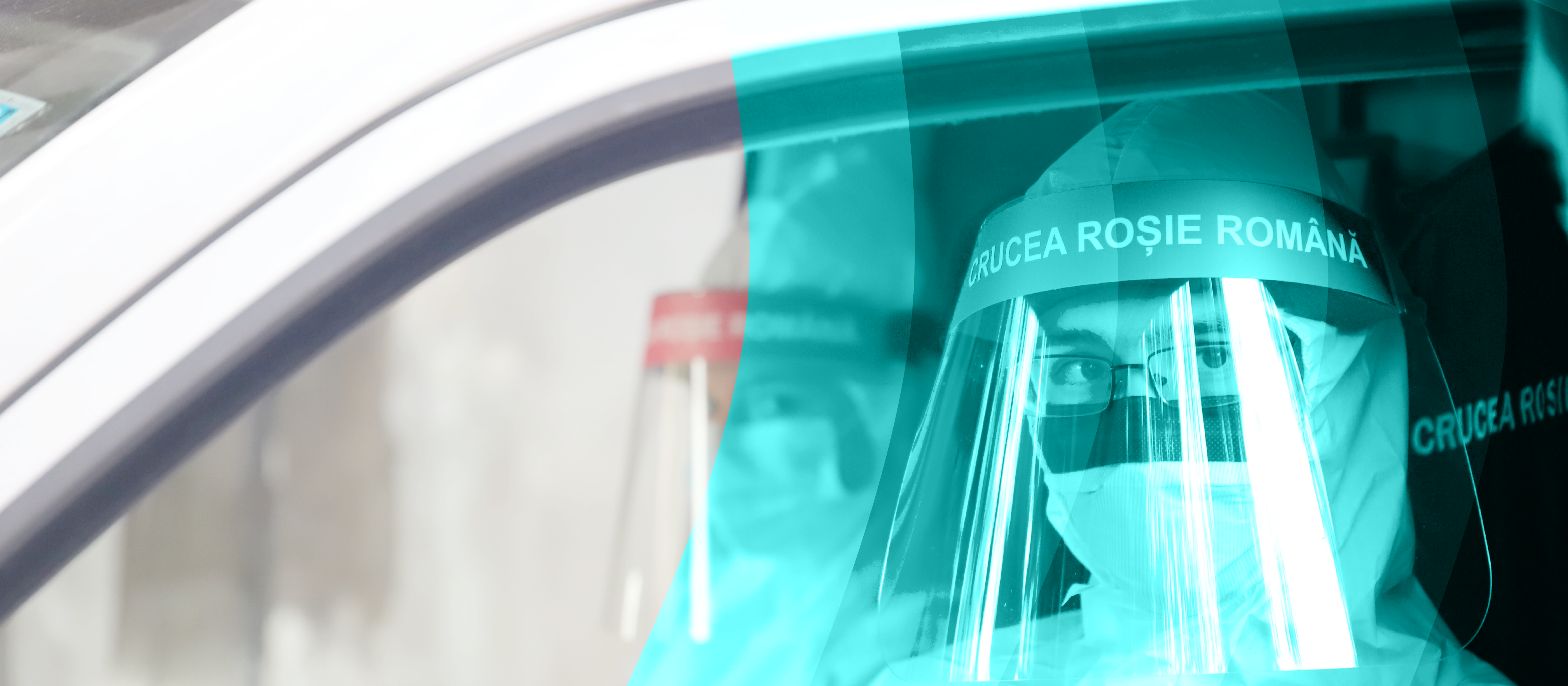
17 Mar Red Cross in the COVID-19 pandemic – how Romania handled the outbreak
The first known case of COVID-19 in Romania was confirmed in Gorj County, on February 26, 2020. On March 12, the Romanian Ombudsman asked President Klaus Iohannis to declare the state of emergency and the Romanian Parliament to approve it. A year later, on February 23rd 2021, the Romanian Government reported 779.695 confirmed COVID-19 cases, 19.847 casualties, 53.806 people under institutional quarantine, a further 49.295 in home isolation under medical supervision (see also here). The country is no longer under emergency state, it is under alert.
Romanian Red Cross is working closely with the state authorities in charge of managing the COVID-19 Crisis – State Department of Emergency Situations, Ministry of Health, Secretariat of the Government. On one hand, we provide support to better containing the spreading of the virus and preventing new infections. RRC launched public campaigns to keep the population informed with verified information and instructions on infection prevention. Through our branches, we distributed information materials on stress mitigation and also how to maintain well-being in this period of crisis and lock-down.
On the other hand, we provide the front-line personnel with the needed materials and equipment, enabling them to fight against the virus and to properly assist the patients, obtaining better results. Based on the authorities’ recommendations of the authorized hospitals and medical care institutions for COVID-19 treatment, Romanian Red Cross has distributed tents for triaje, medical and protective equipment and other equipment and materials needed for the personnel working in the front line. On the local level, Romanian Red Cross branches are working with the County Committees for Emergency Situations, with the General Directions for Social Assistance, the Directions of Public Health, Prefecture and Municipalities.
In the end of last year, Romanian Red Cross has joined a new Horizon 2020 project, COVINFORM, in partnership with 16 other organisations. The general aim of the project is to examine COVID-19 preparedness across Europe in 15 target countries selected for analysis, compare responses and derive lessons learned, develop policy guidelines and promising practices to influence adherence to behavioural advice across different groups in society and improve the resilience, wellbeing and mental health of the population.
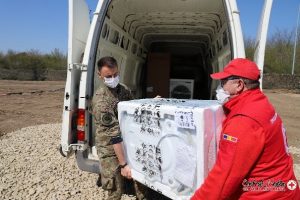 RRC started their work on COVID19 at the end of February, with an online prevention campaign in partnership with the Government. But two weeks later, the situation in the country got out of control and we entered an emergency situation. Everybody was scared and we were anticipating a time of hardships – no one was really prepared. The Red Cross branches became the centre of the universe in their respective counties. There was a big need to help the communities as good as we could. A lot of fears and frustration was gathered and the HQ had to deal with all of this.
RRC started their work on COVID19 at the end of February, with an online prevention campaign in partnership with the Government. But two weeks later, the situation in the country got out of control and we entered an emergency situation. Everybody was scared and we were anticipating a time of hardships – no one was really prepared. The Red Cross branches became the centre of the universe in their respective counties. There was a big need to help the communities as good as we could. A lot of fears and frustration was gathered and the HQ had to deal with all of this.
Immediate decisions had to be made. We realised that we cannot all work from home and we established who comes daily in the office, who works from home, we deployed supplementary staff in the central warehouse, we organised regular meetings online with all branches, we established the limits of our mandate – at what extent we can do what we are asked for, how we can protect the personnel. For example, most of our volunteers are youths, aged 16 – 18. We had to decide not to work with this category for safety reasons. We also decided not to recruit volunteers, also for safety reasons as we needed to work with trained RC people.
We worked day and night, without any time limit. We received many requests for protection materials, not only from COVID hospitals but from all hospitals (even private ones), from local authorities, from law enforcement units. Our first contacts were with quarantine units where we had to deliver food, hygienic products, and logistics (beds, linen, etc); and on the border points, where our branches worked for the triage of the Romanian returned citizens, informing people and delivering food and water.
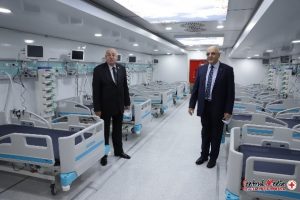
2.000 volunteers and staff worked daily during the lockdown, not without risks – several Red Cross members got the virus and unfortunately one of them passed away. We had to prioritise activities and interventions, whilst staying in the limits of the mandate, we were permanently forced to make choices. We also had to keep in mind that we will continue during “peacetime” and that meant making efforts to maintain current activities – home care, ambulances, the Food Bank.
We are now implementing an information campaign for the population. Although during the initial onset of the pandemic the people were quite disciplined, now the COVID-19 deniers are gaining territory. It is obligatory to wear masks inside, but not everybody respects that, or they wear them improperly. In the rural areas, people do not wear masks at all – partly because they are not informed, partly because they have no financial resources to buy necessary supplies.
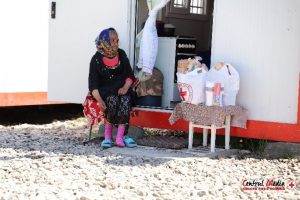
Hygiene is also an issue. In rural Romania, most of the people still don’t have in-house bathrooms. Hygiene sessions need to be organised – washing hands, maintaining physical distance.
A big concern is related to the schools and keeping the children safe and informed. This means materials distributions (disinfectants, masks) and delivery of information sessions.
The teaching online proved to be a disaster for poor kids and for those in rural disadvantaged communities. There are not enough electronic devices for all the pupils to go online. There is no internet connection that supports online classes for 4-5 hours per day. There are families with only one device and 2, 3, or more kids online at the same time, in different classes. The education system is not designed and adapted for online.
And last but not least – the economic crisis. Everybody’s attention – the government’s, the local authorities’, the donors’ and the general public’s – was focused on health workers and frontline hospitals. There was less interest for the poor, isolated, for the elderly, and for the newly poor – people who the coronavirus crisis left with no jobs, repatriated workers from the Western countries.
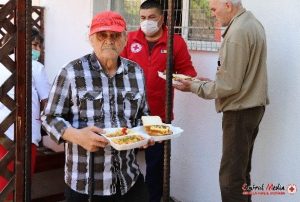
We still have to organise ourselves for the medium and long term. We have to see where is our place now, our role. We hope that sharing good practices, as well as studying interventions and target groups like we do within COVINFORM will help us understand, adapt, and be meaningfully present in society. We hope that through the results of the project we will clarify the definition of vulnerable persons and vulnerable communities so we can respond better to their needs. It will also help us see what was the impact that different national, regional, and local responses have had on vulnerable and marginalised groups, viewed through an intersectional lens. It will contribute to understanding how different factors interconnect, potentially further increasing vulnerability and marginalisation.
We hope that the research carried within COVINFORM will help the Romanian Red Cross define its strategies for inclusive and effective COVID-19 communication, including strategies to influence behaviour change, and carry out a detailed analysis of factors influencing communication practices.
Authors: Andreea Furtuna, Raluca Buzea & Daniel Modoaca
